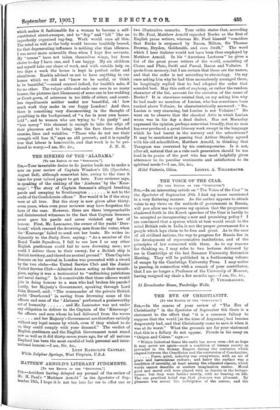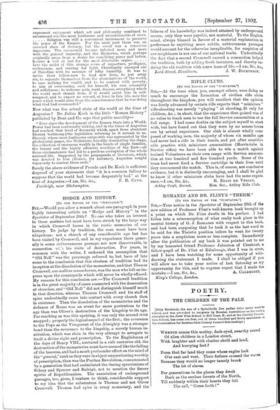THE EVE OF CHRISTIANITY.
[To THE EDITOR OF THE "SPECTATOR:1 SIB,—In the course of your review of "The Eve of Christianity" in the Spectator of September 6th there is a statement to the effect that " it is a common fallacy to suppose that the world [at the time of Augustus] had become desperately bad, and that Christianity came to save it when it was at its worst." What the grounds are for your statement that this is a fallacy do not appear. Fronde in his essay on " Origen and Celans " says :— " Within historical times the earth has never seen—let us hope it may never see again—such a condition of human society as prevailed in the Roman Empire during the centuries which elapsed between the Crucifixion and the conversion of Constantine. Peace, quiet, industry was everywhere, with an air of grace and harmonious culture; and below the surface was a condition of morality, at least among the educated classes, which words cannot describe or modern imagination realise. Moral good and moral evil were played with as fancies in the lecture- rooms ; but they were fancies merely, with no bearing on life. The one practical belief was that pleasure was pleasant. By pleasure was meant the indulgence of the senses; and the
snpremest enjoyment which art and philosophy combined to recommend was the most loathsome and unmentionable of vices.
Religion was still a convenient instrument to preserve the peace of the Empire. For the most part there was an outward show of decency, but the creed was a conscious imposture. The ceremonial became infected more and more with the general impurity, and the Mysteries, which perhaps originally arose from a desire for something purer and better,
became a veil at last for the most detestable orgies Into the midst of this strange scene of imposture, profligacy, enthusiasm, and craving for light, Christianity emerged out of Palestine with its message of lofty humility. It was to invite their fellow-men to lead new lives, to put away sin, to separate themselves from the abominations of the world, to care nothing for wealth and to be content with poverty, to aim at overcoming, each for himself, his own sensuality and selfishness ; to welcome pain, want, disease, everything which the world most shrank from, if it would assist him in self- conquest, and to expect no reward, at least in this life, save the peace which would arise from the consciousness that he was doing what God had commanded."
Now what was the actual state of the world at the time of Augustus ? Dr. Julius Koch in the little " Roman History " published by Dent and Co. says that public morality-
" Ever since the development of the Roman State into a World- Power had been continually sinking, and in the times of Augustus had reached that level of depravity which, apart from abundant literary testimony,Ithe legislation referring to it reveals to us. Slavery, whose most loathsome outgrowth was represented by the gladiatorial games, the Hellenistic frivolity dominating the stage, the collection of enormous wealth in the hands of single families, the luxury and the highly offensive worships of the East—all these circumstances had led to a perilous corruption of the whole national life. Supported by the propaganda of literature, which was devoted to him (Horace, for instance), Augustus sought vigorously to combat these evils."
Surely the above evidence of Fronde and Dr. Koch is sufficient disproof of your statement that "it is a common fallacy to suppose that the world had become desperately bad" at the











































 Previous page
Previous page